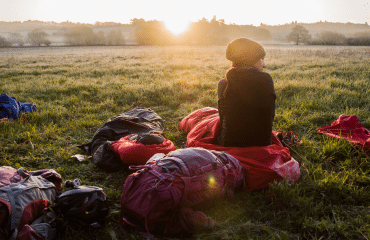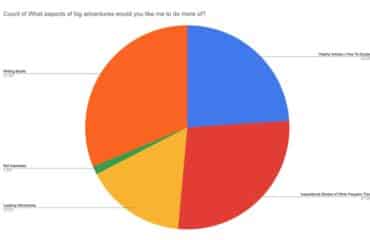Q&A
The power of everyday adventures
Alastair Humphreys has never shied away from adventure ‘“ in fact, he’s made a point of embracing it. His adventuring started at an early age: by eight, he was running across mountains in races like the Yorkshire 3 Peaks. By fourteen, he was cycling off-road across England. During university, he cycled long routes from Pakistan to India, Turkey to Italy, and beyond. When he graduated, he threw himself wholeheartedly into the chase for adventure, cycling across continents, rowing across oceans and hiking through the wild places of the world.
Though he’s gone on some epically big adventures, Alastair believes in the power to be had in going small ‘“ in embracing the adventures waiting for us just outside our own front doors. Alastair calls these trips microadventures: small, cheap, local adventures that anyone can fit around their daily commutes and commitments. The idea is to find everyday ways to rediscover the joy of being outside, discovering new things and spending a night out under the open sky. To see adventure not as a list of far-flung locations and daring deeds, but as an attitude.
You started adventuring right out of university, cycling around the world, rowing across the Atlantic and walking the length of a sacred river in India, among others. What draws you to adventure?
I like exciting, unusual things. If they are spiced with risk, then so much the better. I’mm no daredevil or adrenaline junky, but I relish activities that scare me a little and call for enterprise and enthusiasm. A call to adventure.
If I go somewhere I have never been, step out of my comfort zone and have little idea what tomorrow will bring, then I know I am going to have an adventure. When normal life starts to feel a little bit, well, normal, an adventure is called for.
Life’s not all work. It’s not all seriousness and planning for pensions. ‘˜I won’t have it,’ declared writer Annie Dillard. ‘˜The world is wilder than that in all directions, more dangerous and bitter, more extravagant and bright. We are making hay when we should be making whoopee.’ In other words, there is a time for simple fun.
Adventure in the form of travel is what many people dream of doing when they retire or win the lottery. I chose not to wait for retirement or a windfall, and I didn’t let a lack of money stop me; I just worked out how to travel cheaply. In order to take long trips overseas, I learned how to sleep wild, saving on accommodation costs. I walked so that transportation cost nothing. I ate the cheapest food. My walk across India cost just 500 pounds, of which 300 pounds was the plane ticket.
I travel, amongst everything else, to seek out fun and the warm glow of the sun on my face (though come midday, I will be sweating and cursing it). I slurp mangoes and join in village cricket matches. It is a lot of fun. When people ask, ‘˜why do you travel?’ there’s no simpler and more honest answer than that.
For you, what makes something an adventure?
Most people would agree that cycling across one of the world’s great mountain ranges is an adventure. So is waking in a tent buried in snow, or paddling whitewater rapids, or rowing through a tropical storm through steep waves lit by a silver moon. But adventure need not be any of these things. I think the core of adventure is actually something much deeper, though it is undoubtedly expressed though travel, expeditions and extreme sports.
The best way to define adventure is to think, briefly, about what adventure is not. It is not about world records, beating others, making a story, a film, a pile of cash, getting famous online, generating ‘˜content’, or repeating what you’ve already done but faster.
In my opinion, adventure is mainly in the mind. Adventure is an attitude. It’s doing something that is new; something difficult, exciting, daunting. Something with a significant chance of failure and an enticing sense of satisfaction upon completion. Adventure involves unpredictability and uncertainty ‘“ that’s part of the ultimate reward.
It should be pursued with determination, significant effort, curiosity and (when possible) a sense of humour.
Even though you’ve experienced some epic adventures in far-flung places, you’ve also championed the idea of adventures close to home. Can you explain what a microadventure is, and why/how you came up with the idea?
As I toured around, giving speeches about my adventures and the joy of getting out and having them, I kept hearing the same thing over and over: ‘˜You are an Adventurer. I am a Normal Person.’ Which, to me, is total rubbish. Everyone is both an adventurer and a normal person ‘“ myself included. I wanted to show that the only barrier between Adventurer and Normal Person is the one we build ourselves; I wanted to bring that barrier down by helping people find adventure in whatever form they could. So I decided to dedicate a year to discovering my own country by going small ‘“ really small. I went in search of tiny adventures close to home.
Most people don’t have time to cycle around the world or the level of fitness needed to climb Everest, but that doesn’t mean they can’t go on adventures. So microadventures are deliberately small in scale. They are short, cheap, simple and often local. But they also tax the adventurer, both mentally and physically. They push me to discover new places and escape everyday routine, even if only briefly.
Maybe you’re feeling like the city you live in is boring or stifling, and that somewhere wild is where adventure exists. Maybe you liked camping as a child, but now your obligations keep you from getting out. It’s these very feelings that microadventures are meant to break through. They are meant to grab you, firmly but politely, and shake you into rediscovering rivers and mountains, to remember the many joys to be found in exploring the world around you.
Part of the crux of microadventures is that people can go and do something new anywhere, anytime ‘“ including the hours after and before work, between 5pm and 9am. Is this just about ease and accessibility, or do you think there’s something special about seeing your home with new eyes?
Both! It’s about looking differently at your circumstances (lack of time) or your home (finding adventure in familiar places). Once you learn that you can find wildness and adventure close to home, you have fewer excuses to blame inertia on a lack of time or resources.
What are some of the microadventures you’ve done close to home?
I walked a lap of the 190-kilometer (118-mile)-long M25 highway that circles London, which was far from the best night’s sleep I’mve ever had (the highway never sleeps). I’mve gone on the same overnight hike in the same woods, but across all four seasons so I could get to know it in all its forms.
I even grabbed a sleeping bag, bivvy bag, Thermarest, raincoat and my camera and went for a microadventure around my home. I wanted to make the radius big enough that I could leave at five in the afternoon, complete the circle and be back at my desk by nine the next morning. It was cheap, logistically simple and an excellent way to explore and discover my local wild places, and much more slowly than I normally do. It reminded me how easy it is to get away from ugly, built-up areas and find tiny pockets of beautiful wilderness. All you have to do is take the time to look.
Microadventures can be really flexible based on time and location ‘“ do you have an absolute rule for what makes a microadventure?
Douglas Bader once said, ‘˜rules are for the guidance of wise men, and the obedience of fools…’ I don’t mind what people do, so long as they do something. Having said that, I believe that spending a night out under the stars makes an experience significantly more memorable, rewarding and potentially transformative than just having a day trip. By all means, ride your bike all day. But if you sleep out in a bivvy bag, too, you will have done something far more adventurous.
You became National Geographic’s Adventurer of the Year in 2012 because of your work on microadventures. Why do you think this idea resonated with people?
I believe it was because it was accessible, achievable and realistic for normal people with busy, real lives. A lot of the adventures we consume are vicarious ‘“ almost like adventure-porn. Cycling round the world, rowing the Atlantic: it’s titillating, exciting, but not anything someone with a job and a family will ever do. Microadventures have struck a chord because they have brought adventure to ordinary people, rather than making them feel left out and inferior.
What would you say to someone who says they can’t get out on an adventure?
I would say that you can.
I’mm aware, of course, that some people genuinely have significant hurdles in life ‘“ disability, for example ‘“ but for the vast majority of the world, this is what I would tel lthem:
Instead of saying to yourself, ‘˜I don’t have the time to do this’ or ‘˜I can’t afford to go on that trip’, try saying the same thing, but with ‘˜choose not to’. ‘˜I choose not to do this.’ ‘˜I choose not to save up for that trip.’ Because most of the time, if you want something ‘“ really want it ‘“ you can find a way.
Saying to yourself that you choose not to do it might help clear your head and make you realise that what you thought was a genuine constraint is actually just a mental block you have created for yourself.
Perhaps you are scared; perhaps it will be really difficult; perhaps you don’t quite have the will to make it happen. But at least now you’ll be a little closer to having an honest answer.
How do you balance microadventures with bigger adventures?
Microadventures fit nicely into the gaps between big ones ‘“ no balance required. I try to have as many of both kinds as I can! And in the periods between big ones, when I’mm writing/saving/busy with everyday life, I escape as often as I can for a night on a hill in a bivvy bag.
I relish activities that scare me a little and call for enterprise and enthusiasm. A call to adventure.
In my opinion, adventure is mainly in the mind. Adventure is an attitude.



Comments